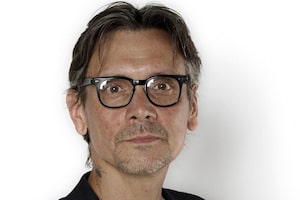Don't expect to hear The Counselor mentioned at the Oscars this year, except maybe as the butt of a joke like this: "The only time Sandra Bullock felt lonelier than when she was stranded in outer space in Gravity is when she went to go see The Counselor."
One of the year's most over-roasted turkeys, Ridley Scott's direction of revered American author Cormac McCarthy's first original screenplay drew the kind of savage notices usually reserved for dumb teen comedies, torture-porn movies and Steven Seagal pictures. "Derivative nonsense," declared Time. "A very bad film," echoed the New Republic. Time Out called it "a great writer's pompous idea of pulp fiction, treated with stultifying seriousness by everyone involved." The Observer said "blah bloody blah."
Why the hate? It's a question that will only be asked by the minority who liked it – busted, I admit – especially when they're watching the extended cut of the movie just released on DVD and Blu-ray. At 138 minutes, the longer version of The Counselor merely extends existing scenes – which means more to love for those few who are inclined, and more to hate for the rest.
Here are the most common of the criticisms: The movie's too talky; McCarthy's script is too literary; Scott's direction is too turgid; and the story is not only derivative, it's derivative of McCarthy himself – sleek-suited New Mexico attorney (Michael Fassbender) signs on for a one-shot drug importing deal even though everybody tells him there'll be hell to pay.
Many detractors see it as a No Country For Old Men knock-off, but lacking in the danger, excitement and sheer visceral momentum.
But to me, The Counselor played beautifully as a clearly non-naturalistic, almost dreamy take on film noir. From the opening, when Fassbender and Penelope Cruz are talking dirty under clean sheets, through the over-the-top car-sex scene to Cameron Diaz's erotic dissertation on the beauty of hunting at the very end, the movie is clearly not asking us to take its plot seriously. It does ask us to take seriously the idea of the drug trade as an all-too-logical end-game of consumer culture. And that's what all the talk is about.
Granted, The Counselor shares much of No Country's worldview. Once again we're in the drug war along the U.S.-Mexico border, and once again the story is motivated by a single suicidal impulse. In No Country it was trailer cowboy Josh Brolin's interception of a suitcase full of cartel cash; in The Counselor it's Fassbender's oblivious delusion that he can buy into the world's bloodiest business and remain unbloodied. Of course he can't.
The 21st-century drug business is a metaphor for human enterprise at its most impersonal, relentless and sociopathic, which is thriving in a world in which the bottom line trumps all else. So Fassbender's deal is a deal with the devil, and the devil inevitably comes to collect, as he did in No Country.
So yes, we are revisiting familiar territory with The Counselor. But is this really a sign of bankruptcy, of a writer with nothing new to say and a director who doesn't know how to say it?
Or is it about a writer who's very deliberately working a deep groove, one with a good metaphor that isn't exhausted in one expression? Many established writers, both pulp and literary, have been prone to creatively reassembling familiar elements. Dashiell Hammett wrote variations on the same story throughout his career, as did John Cheever and Ray Bradbury, and as do James Ellroy and Annie Proulx. If the drug war serves McCarthy as an apt symbol of a spiritually desolate world – kind of a big theme, I'd say – why wouldn't he return to it?
Besides, maybe McCarthy found holes in No Country that motivated him to fill them in with a new screenplay. In the earlier story, he kept the action percolating, the dialogue minimal and the pontificating to Tommy Lee Jones' sparse voice-over; in The Counselor, the action is entirely foretold and inevitable, and the dialogue is floridly abundant. And Scott's direction, cool and detached, serves the script perfectly.
This movie casts thought, words and reflective rumination as the only things standing between us and hell. The whole point is that the counsellor ignores them. His world ends because he won't and can't listen.
Special to The Globe and Mail
 Geoff Pevere
Geoff Pevere